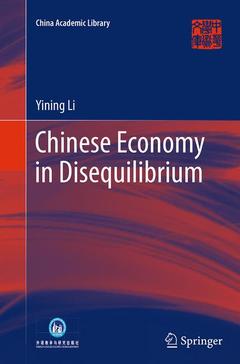Chinese Economy in Disequilibrium, 2014 China Academic Library Series
Auteur : Li Yining

Known internationally as ?Mr. Shareholding? economist, Li Yining has had a transformative impact on China's economic transition, most notably as an early advocate of ownership reform and in his promotion of shareholding theory. By examining the interrelationship between the government, enterprises and the market, Chinese Economy in Disequilibrium presents an in-depth discussion on the issues of resource allocation, industrial structure, institutional innovation and economic fluctuation in the current Chinese economy under the condition of disequilibrium. Credited with developing the theory of economic disequilibrium, Professor Li distinguishes two types of disequilibrium on the basis of whether or not the majority of firms in the economy are viable profit-makers. In Chinese Economy in Disequilibrium, Professor Li points out that not only has China?s economy been in a state of disequilibrium, but it also has issues with enterprises not being under budget constraint. Given the limitations of market regulation under economic disequilibrium, Professor Li advocates the reform of the enterprise system and upholds the government?s leading role in the establishment of order in the socialist commodity economy. A number of measures are also proposed with the aim of facilitating the transition of China?s economy from disequilibrium to equilibrium. The central theme is that the reform and transition are means to serve economic growth and social development, which would eventually benefit the ordinary citizens in society.
Yining Li is a Professor of Economics and Emeritus Dean of Peking University?s Guanghua School of Management. He is one of China?s foremost economists, and the author of twenty books and numerous articles on a wide range of economic subjects including reform and development in China. He has received a number of prestigious awards and honours for his research. As the leading proponent of a market economy in China, Professor Li has had a tremendous influence on China?s economic reform policy over the last three decades. He has served on the Standing Committee of the National People?s Congress of China and is currently Vice-Chairman of the Economic Committee of the Chinese People?s Political Consultative Conference.
Preface.- Exploring The Issues In Resource Allocation.- Market Regulation And Resource Allocation.- Government Regulation And Resource Allocation.- The Mechanism Of The Operation Of The Economy.- Rationing Equilibrium Of The Commodity Market.- Easing Supply And Demand Mismatch Under Disequilibrium Economic Conditions.- Industrial Restructuring.- Government Regulation On Agriculture.- Establishing The Order Of The Socialist Commodity Economy.- The Standardization Of Institutional Innovation.
Li Yining’s career has spanned some of the most turbulent periods in twentieth-century Chinese history. He has witnessed at firsthand the many changes that have taken place in China over the past eighty years, and his personal experiences have had a profound influence on the development of his academic ideas.
Li Yining was born in Yizheng, Jiangsu Provence in 1930. He enrolled in the Department of Economics at Peking University in 1951, where he was introduced to western economic theory and history by influential scholars such as Luo Zhiru and Chen Daisun. Li joined the Peking University faculty in 1955, but for the next twenty-five years his research was interrupted repeatedly by political initiatives. In 1958, Li spent a year engaged in manual labour with colleagues in west Beijing. In 1964-5, and again during the years of the Cultural Revolution (1966-76), he was frequently dispatched to rural areas where he undertook farm work while being ‘re-educated’ by local farmers. It was not until November 1976 that Li was able to return to Peking University and full-time academic research. His personal experience of the damage done to the national economy by political movements and the poverty he saw in rural areas challenged his belief in traditional socialism and changed his economic views.
Since 1979, Li has published numerous books and articles while teaching at Peking University. He is renowned as one of China’s foremost economists. During the 1980s, applying modern economic theories distilled from his decades of study, Li set forth a series of reform proposals which have played a central part in China’s transition to a socialist market economy. His advocacy of corporate reform and the shareholding system has been crucial to China’s economic development over the last three decades. Alongside his commitment to transitional and development economics, Li has also published widely on comparative economic history and economic ethics, interests that have in
Professor Li regards this book as the most representative of his academic works on current Chinese economy. Of all his published works, this presents the most in-depth theoretical analysis of economic disequilibrium
This book adds to the existing literature in English that examines China’s economic development by providing carefully examined alternative perspectives, which scholars and students in the West may not be familiar with
This Book allows readers to retrace the innovative and bold contributions Professor Li has made to the success of China’s economic transition
Date de parution : 08-2016
Ouvrage de 203 p.
15.5x23.5 cm
Date de parution : 12-2013
Ouvrage de 203 p.
15.5x23.5 cm
Thème de Chinese Economy in Disequilibrium :
Mots-clés :
Chinese Economy; Disequilibrium; Enterprises; Government; Market
